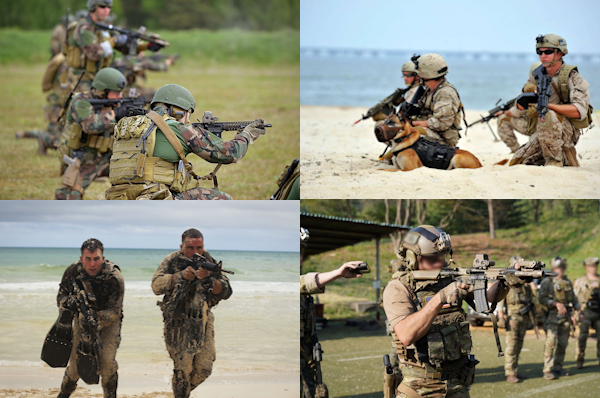What are the most elite special forces in the world?
There are many that consider U.S. special forces like Navy SEALs and Green Berets among the best.
Furthermore, others like Marine Raiders (MARSOC) and Marine Recon units do not receive nearly the attention and praise they deserve.
Discover more about the primary differences between the top U.S. special forces.
Related Article – Green Berets Vs. Rangers: 5 Major Differences
Table of Contents
MARSOC vs. Navy SEALs vs. Green Berets vs. Marine Recon
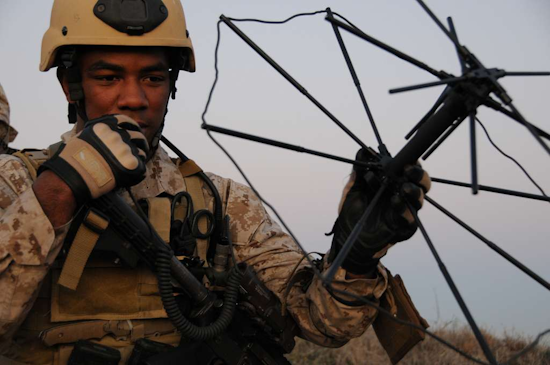
In general, most consider Marine Raiders (MARSOC), Navy SEALs, Green Berets, and Marine Recon among the best special forces.
However, each Special Operations Force (SOF) has something different to offer.
Here is a side-by-side comparison of the similarities and differences between the different elite special forces:
| MARSOC | Navy SEALs | Green Berets | Marine Recon | |
|---|---|---|---|---|
| Established | 2006 | 1962 | 1952 | 1944 |
| Motto | "Always Faithful, Always Forward" | "The Only Easy Day Was Yesterday" | "To Liberate the Oppressed" | "Swift, Silent, Deadly" |
| Size | 3,195 | 2,500 | 6,700 | 2,000+ |
| Command | Marine Forces Special Operations Command | Naval Special Warfare Command | 1st Special Forces Command (Airborne) | MAGTF Support Element |
| Purpose | - Direct Action - Special Reconnaissance - Foreign Internal Defense - Counterterrorism - Information Operations | - Direct Action - Counterterrorism - Special Operations - Special Reconnaissance - Unconventional Warfare | - Direct Action - Counterterrorism - Counterinsurgency - Special Reconnaissance - Unconventional Warfare - Foreign Internal Defense | - Direct Action - Ground & Amphibious Reconnaissance - Information Operations |
| Headquarters | Camp Lejeune, North Carolina | Naval Amphibious Base Coronado, CA and Naval Amphibious Base Little Creek, VA | Fort Liberty, North Carolina | Camp Pendleton, CA, Camp Lejeune, NC, and Camp Schwab, Okinawa |
What are MARSOC Raiders?
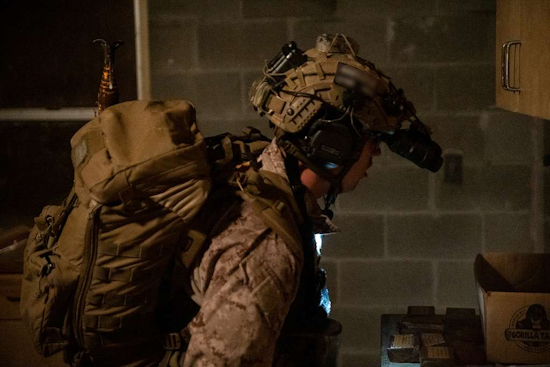
The United States Marine Forces Special Operations Command (MARSOC) is a component of Special Operations Command (SOCOM).
As such, it’s the Marine Corps’ primary contribution to SOCOM with the ability to provide direct action, special reconnaissance, and foreign internal defense.
Recently, the military role of MARSOC has expanded to information and surveillance, as well as counter-terrorism in the wake of the War on Terror.
The primary unit of MARSOC is the Marine Raider Regiment (MRR).
It consists of a Headquarters Company along with 3 Marine Raider Battalions (1st, 2nd, and 3rd).
Accordingly, the base unit of MARSOC is a 14-man Marine Special Operations Team (MSOT).
Military personnel within MARSOC include:
- Critical Skill Operators (CSO)
- Special Operations Officers (SOO)
- Special Operations Combat Service Specialists (SOCS-S)
These teams can operate independently or combine to be part of a larger military unit, like MSOC or SOTF.
Marine Raiders are versatile special operatives who are well-trained in the many forms of unconventional warfare.
For this reason, Raiders also provide military training to many allied foreign nations.
Related Article – Marine Special Forces: 10 Elite USMC Units
What are Navy SEALs?
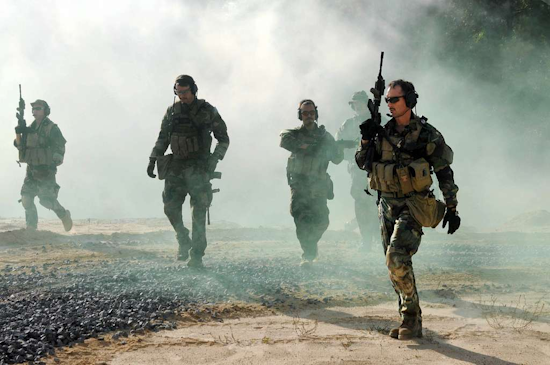
The United States Navy Sea, Air, and Land (SEAL) Teams are among the most elite in the world.
Navy SEALs serve as the primary special operations force and component of the Naval Special Warfare Command (NSW).
These small units perform special operations behind enemy lines often in adverse or hostile environments.
Thus, Navy SEALs are trained to encounter maritime, jungle, arctic, mountainous, and desert climates.
Generally, SEALs are ordered to capture or eliminate high-level targets along with gathering intelligence on enemy forces.
As a result, Navy SEALs are highly trained and proficient in direct action and special reconnaissance.
Navy SEALs are divided between West Coast (Naval Special Warfare Group 1) and East Coast (Naval Special Warfare Group 2).
Furthermore, these operatives are divided into additional SEAL teams and deployed anywhere in the world.
Navy SEALs consist of snipers, breachers, communicators, engineers, navigators, heavy weapons operators, and many other military roles.
SEALs assist in joint operations and some of its operatives are recruited to join the CIA’s top-secret Special Operations Group (SOG).
Related Article – Green Beret Vs. Navy SEAL
What are Green Berets?
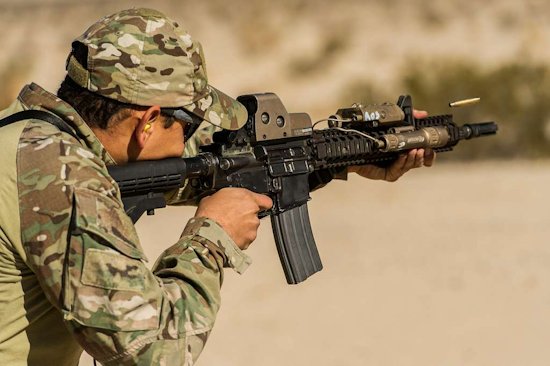
The United States Army Special Forces (SF), better known as Green Berets, also rank among the best.
Army Green Berets have a terrific reputation and are distinguished by their unique headgear.
Green Berets offer special operations assistance in multiple forms of unconventional warfare, including:
- Direct Action
- Counterterrorism
- Counterinsurgency
- Special Reconnaissance
- Foreign Internal Defense
- Information Operations
Additionally, Green Berets have evolved into a capable hostage rescue and combat search and rescue team.
Green Berets, like many other U.S. special forces, were instrumental during the invasions of Afghanistan and Iraq.
During times of peace, the military unit provides training to foreign troops.
As such, these operatives must master a second language as part of their extensive military training.
Today, much of the military operations of Green Berets and other special forces is highly classified.
Nonetheless, most agree that Green Berets are masters of unconventional warfare and developing foreign guerrilla forces.
Related Article – Green Berets Vs. Delta Force
What is Marine Recon?
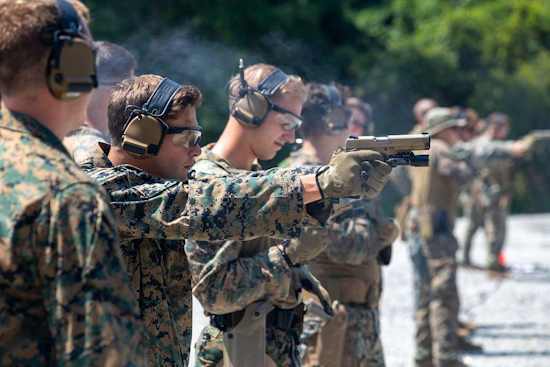
“Swift, Silent, Deadly.”
It’s the motto of the United States Marine Corps Reconnaissance Battalions, better known as Marine Recon.
These special operations forces perform risky or dangerous amphibious reconnaissance for the U.S. Marine Corps.
They answer to the Marine Air-Ground Task Force (MAGTF) and are designed to observe and report on enemy activity.
As such, they provide invaluable information regarding the position of enemy forces along with other critical details.
Marine Recon is different from other unconventional SOCOM forces in that they directly assist infantry units.
Thus, military personnel are directly involved in the battlefield and play a huge role in the success of any operation.
Marine Recon reconnaissance missions are categorized based on the depth of penetration.
Consequently, the deeper a Marine Recon unit must infiltrate enemy forces, the higher the risk of being captured or killed.
For this reason, Marine Recon plays a different yet equally important role in military operations.
Differences in Requirements / Qualifications
What are the requirements to join U.S. special forces?
In general, most special forces have similar requirements such as:
- Citizen of the United States.
- Between the ages of 18 – 30.
- High school diploma or GED for enlisted, and college degree for officers.
- Pass a comprehensive background check / investigation.
- Complete a physical, psychological, and medical evaluation.
However, that’s not the end of the qualifications necessary to join forces like Green Berets and Navy SEALs.
For starters, those seeking to enlist must take the Armed Services Vocational Aptitude Battery (ASVAB).
It’s important that you perform well on the military exam because most special forces have minimum scores you must obtain.
For example, MARSOC requires that candidates have a minimum General Technical (GT) score of 105 and 110 for officers.
Additionally, most elite special forces have additional tests and assessments they must complete.
Navy SEALs and Green Berets, for example, must complete Parachute Jump School.
Meanwhile, others require the completion of a swim assessment (MARSOC), underwater diving course, or Airborne School.
Operators must obtain and maintain a Top Secret clearance security level which usually entails having a clean record.
NOTE: Speaking with a local military recruiter can help address any questions or concerns you have about meeting eligibility requirements.
Differences in the Selection Process
Which U.S. special forces is the most difficult to join?
Candidates seeking to become MARSOC Raiders, Navy SEALs, Green Berets, or Marine Recon all go through an extensive selection process.
The selection process is designed to eliminate unqualified candidates as they must endure multiple stages of education and training.
In general, military training (more details, below) is divided between 1) basic and introduction phase, and 2) advanced training.
The advanced training is related to the military specialty or role, the operator will be assigned to in special forces.
For example, Green Berets attend 4 phases of training collectively known as the Special Force Qualification Course (Q Course).
The length of advanced training (and the overall selection process) varies but usually takes at least 1 – 3 years.
Meanwhile, other special forces (like Navy SEALs) endure several stages in the selection process designed to train them mentally as much as physically.
Navy SEALs must pass a demanding physical screening before surviving Basic Underwater Demolition / SEAL (BUD/S) training.
Then, there is Survival, Evasion, Resistance, and Escape (SERE) training which is mandatory for most new recruits.
The selection process is just as extensive for Marine Raiders (MARSOC) and Recon units.
As such, the purpose of the grueling process is to verify that the candidate is qualified for a role in special forces operations.
Related Article – Green Berets Vs. Rangers: 5 Major Differences
Differences in Military Training
The military training of special forces like Green Berets, Marine Raiders, and Navy SEALs is legendary.
In fact, many consider Navy SEAL training among the most intense and rigorous in the world.
The washout rate for Navy SEAL candidates averages 75% with only a handful of recruits making it past “Hell Week.”
Navy SEAL training includes Airborne School, BUD/S training, and SEAL Qualification Training (SQT).
Meanwhile, Army Green Beret training is just as notorious and easily one of the hardest programs to complete.
Green Berets must also attend Army Airborne School and Underwater Diving courses.
Furthermore, candidates must learn a second language and become experts in another culture / foreign nation.
| Marine Raiders | Navy SEALs | Green Berets | Marine Recon | |
|---|---|---|---|---|
| Duration | 1 - 2 Years | 2 - 3 Years | 2 - 3 Years | 1 - 2 Years |
| Training Programs | - Marine Special Operations Individual Course (ITC) - Special Operations Training Course (SOTC) | - Naval Recruit Training - Naval Special Warfare Prep School - Basic Underwater Demolition/SEAL Training (BUD/S) - Army Airborne School | - Special Forces Preparation and Conditioning (SFPC) - Special Forces Assessment And Selection (SFAS) - Army Airborne School | - Scout Sniper Course - Marines Awaiting Reconnaissance Training (MART) - Reconnaissance Training and Assessment Program (RTAP) - Basic Reconnaissance Course (BRC) |
| - Phase 1: Record Screening - Phase 2 : Physical Screening - Phase 3: Medical / Psychological Screening - Phase 4: Individual Training Course | - Phase 1: Naval Recruit Training - Phase 2: BUD/S Orientation - Phase 3: SEAL BUD/S Training - Phase 4: Army Airborne School - Phase 5: SEAL Qualification Training - Phase 6: Advanced Training | - Phase 1: MOS Training & SERE Training - Phase 2: Small Unit - Phase 3: Robin Stage - Phase 4: Graduation - Phase 5: Language & Culture - Phase 6: Military Free Fall Parachute Course | - Phase 1: Basic RECON Course (BRC) - Phase 2: Physical & Mental Training - Phase 3: Advanced Training |
Marine Corps (MARSOC) Training
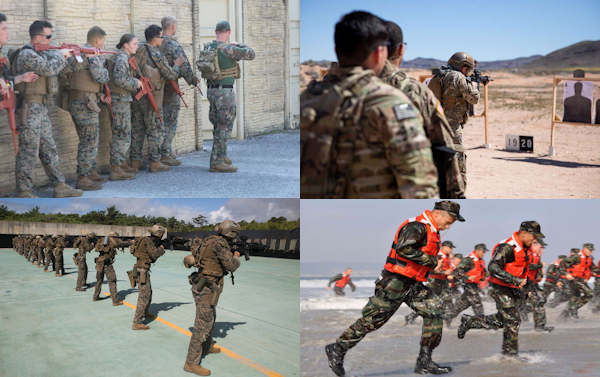
On the other hand, Marine Raiders (MARSOC) and Recon units may not have garnered the same reputation but it’s not to suggest training is a cakewalk.
Marine Raiders spend 6 weeks completing the Special Operations Training Course (SOTC) and must also survive SERE training.
They even get to spend several weeks working alongside highly trained canines used for warfare purposes.
Marine Recon combines traditional special forces training with becoming prepared for surveillance and reconnaissance operations.
U.S. Special Forces Weapons & Gear
There is some crossover between the weapons and gear used in various U.S. special forces.
For example, both Navy SEALs and MARSOC Raiders have recently embraced the Glock 19 as their sidearm of choice.
Special forces usually prefer similar weapons, especially once they develop a reputation for being durable and reliable.
Operators rely on these weapons to perform in a variety of climates and weather conditions.
Nevertheless, special forces have their own standard-issued gear and weapons:
Army Green Berets
- Beretta M9 Handgun
- M4A1 Assault Rifle
- Grenade Launcher (MK19, Mod 3)
- MK16 SCAR-L Rifle
- MK12 Mod 0 Sniper Rifle
- SASR .50 Anti-Material Weapon
Marine (MARSOC) Raiders
- Glock 19 Sidearm
- MK 18 SBR Rifle
- MK 13 Sniper Rifle
- M4 Super 90 Shotgun
- Colt M4 Assault Carbine
- Heckler & Koch HK 416 Assault Rifle
Navy SEALs
- Glock 19
- Sig Sauer P226
- M4A1 Assault Rifle
- MK18 CQBR
- Sniper Rifle MK12, Mod 1
- M249 SAW Machine Gun
Special Operations Forces (SOF) also equip combat and protective gear including ballistic vests, rucksacks, first aid kits, combat helmets, and boots.
NOTE: The weapons and gear list is by no means complete. Special operatives employ a wide range of combat and protective gear.
Related Article – Navy SEAL Weapons And Gear
Conclusion
What are the most elite special forces in the world?
There are many that narrow it down to well-known and respected teams like Army Green Berets and Navy SEALs.
Meanwhile, Marine (MARSOC) Raiders and Recon units do not receive nearly the same attention and praise they deserve.
While these special forces may have some noticeable differences in terms of operations and military training, they are also comparable in other regards.
Featured Image Sources:
- Replacing Dog Tags: 6 Things You Need to Know - June 28, 2024
- Navy OAR Test Study Guide - June 24, 2024
- 10 Best Sniper Movies of all Time - June 20, 2024
Originally posted on September 9, 2023 @ 7:12 pm
Affiliate Disclosure: This post may contain affiliate links. If you click and purchase, I may receive a small commission at no extra cost to you. I only recommend products I have personally vetted. Learn more.
